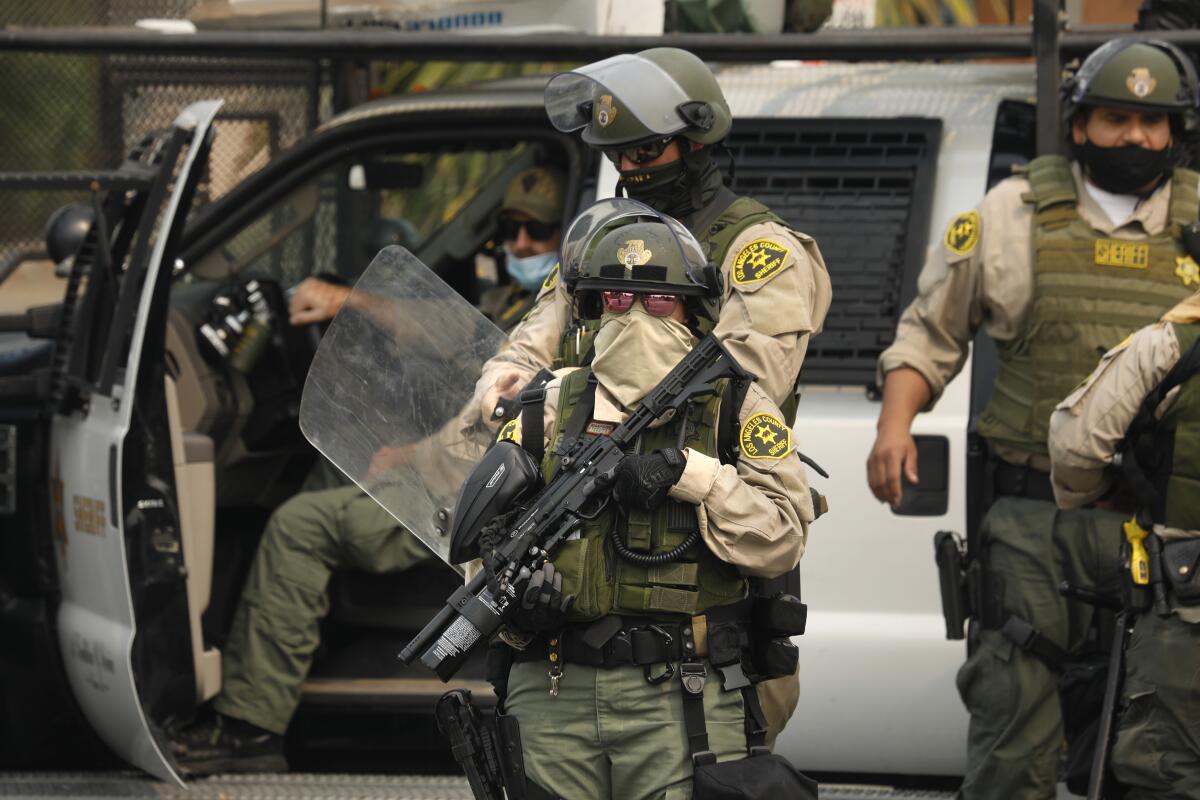Majority of L.A. County sheriff’s deputies did not complete training requirements, audit says

Thousands of Los Angeles County sheriff’s deputies, supervisors and dispatchers have not completed required training courses in recent years, according to a California oversight agency.
An audit last year by the Commission on Peace Officer Standards and Training found that more than 80% of the thousands of sheriff’s deputies and supervisors included in commission databases had not met at least one of many training requirements, including firearms competency and arrest tactics.
The commission sets training standards for California law enforcement, which include a minimum of 24 hours of coursework every two years. More than 600 agencies, including the Sheriff’s Department, have agreed to meet those requirements and, in return, receive funding, training programs and other support from the state.
The commission reviewed records from 2019 and 2020 that showed 7,729 sheriff’s employees were in law enforcement assignments that require certain training. The audit found 2,462 of the employees had not completed firearms courses, about 2,350 deputies had lapsed on driver awareness training and more than 1,650 deputies had missed required courses on how to arrest and control suspects, the audit found. Many deputies were deficient in multiple categories.
In addition, more than half of the Sheriff’s Department’s 483 dispatchers, who coordinate which deputies will respond to calls for help, did not complete some or all of their training, the audit said.
The 2,922 deputies assigned to L.A. County jails were excluded from the audit because they are not required by the commission to complete the training courses until they are reassigned to patrol or other assignments, the audit said.
Sheriff Alex Villanueva told The Times that the Sheriff’s Department has made progress in training personnel since he took over the department in December 2018. He said compliance with training requirements is at 37%, up from 22% when he started.
“It is also important to note, if someone is missing one hour of the 24 hour mandated, they are considered delinquent. A large number of all our people have almost all the training completed, but are just missing a four hour segment,” Villanueva said by text.
Villanueva blamed the deficiencies on a lack of funding, saying it costs $7 million to offer eight hours of training to the department’s sworn personnel.
“Ask the board why do they think their actions are acceptable,” he said, referring to the county’s Board of Supervisors, which sets the sheriff’s budget.
Supervisors did not respond to requests for comment.
The sheriff said the training shortfalls have a “huge impact” on public safety and expose the department to costly verdicts in lawsuits.
The tactical handgun training covers firearms safety, how to make decisions on when to shoot and when not to shoot, and the fundamentals of marksmanship, according to the commission’s website. Other topics covered in the courses deputies had not completed include deescalating tense situations, report writing and the use of force.
State officials said the pandemic may have contributed to the Sheriff‘s Department’s low compliance rates.
“COVID was a reason why folks didn’t get training because training facilities were closed,” said Christine Ford, the commission’s bureau chief of training delivery and compliance. “You can’t teach firearms in an online platform — or driving.”
But compliance with training requirements was already low before the pandemic. A previous audit, which covered 2017 and 2018, found deficiencies similar to the recent review.
Ford and the state official who conducted the audit of the Sheriff’s Department, Matthew O’Deane, said some deputies also may have been injured or on military leave, which could be why they didn’t complete the training.
Across the state, staffing shortages and budget problems also contribute, O’Deane said. In areas that are short staffed, he said, sending an officer to training for a day may require bringing in another officer to cover their shift.
“In those scenarios, it’s very difficult to do training,” he said.
The Sheriff’s Department, Villanueva said, lost 1,281 positions in fiscal year 2020-21— jobs county officials said were eliminated from the budget because they were vacant or after the employee was reassigned.
More to Read
Sign up for Essential California
The most important California stories and recommendations in your inbox every morning.
You may occasionally receive promotional content from the Los Angeles Times.











